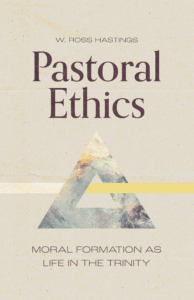
In this excerpt from Pastoral Ethics: Moral Formation as Life in the Trinity, W. Ross Hastings summarizes the current difficulties confronting pastoral ethics and emphasizes the subject’s theological grounding.
There are many reasons why pastoral ethics is an excruciatingly challenging subject in this era of human history. First, the matter of the moral formation of the pastor has not been much spoken of in the pastoral literature, and it has been underemphasized in seminary training. In light of the steady stream of moral failures of pastors in both Protestant and Catholic churches, this can no longer be neglected. Once-revered pastors have weakened the witness of the church by their sexual and financial malfeasance, bringing about the mockery and distrust of this generation concerning the church, making an already cynical population even more resistant to the gospel. Pastors with integrity over the long haul, right on to the end of their lives, are a precious commodity.
Second is the difficulty of the ethical issues of our times. In a post-Christian, secular age, ethicists do not agree on what is (ontology), and therefore there is precious little grounding for what we can know (epistemology) when it comes to ethical inquiry. For pastors, doing ethics in a way that first guides their churches, and then offers guidance to the culture, requires great wisdom and grace. This will involve presenting ethical perspectives that are grounded in an ontology of the being of the Triune God, and that require a corresponding epistemology enabled by the revelation of the Triune God—an epistemology of “faith seeking understanding.” Pastors need to offer ethical counsel in a gospel tenor and tone, but it need not be offered apologetically. Pastors may make the bold assertion in the public square that all thought of every political and philosophical stripe is also arrived at in a similar manner.
Beyond the difficulty of establishing a common ground for debate, the complexity and politicized nature of the ethical issues is hugely challenging. The advancement of science has made things possible with respect to beginning- and end-of-life issues that were not anticipated in previous generations. The full gamut of sexual issues—same-sex marriage, homosexuality, transsexual possibilities, gender dysphoria, and in vitro fertilization, to name a few—as well as issues arising within stem cell research, transhumanism, and so on, all require some background scientific knowledge, even if it is only knowing what science does not yet know. Complicating matters further, sometimes the church is so enculturated that it sees ethical issues in exactly the same way its culture does, so that it needs conversion under the influence of biblical narratives and theological teaching.
But third, there is the difficulty that has surrounded ethics as a theological discipline in the history of systematic theology. What should be the other half of systematics, that is, the complement to dogmatics, is ethics. Dogmatics and ethics make up the discipline of theology. Theology without ethics becomes Gnosticism; ethics without theology becomes legalism and death. Yet often there is no instruction in seminaries on this issue. There are theologians such as Karl Barth, who very much believed in ethics but just as staunchly believed it should not be a separate section in dogmatics. This would keep ethics within theology, within the gospel, not separated from it. One could say that the apostle Peter wrote his epistles in a similarly integrated way. Paul may have been less obvious about this, one could say, since he often has two sections in his epistles, one for dogmatics and the other for ethics. But he certainly carried over the implications of the indicatives of the gospel into the imperatives (and subjunctives!) of the gospel.
Pastoral ethics must, therefore, be grounded in theological ethics, and theological ethics is just that: theological. To seek to know what is right or wrong, outside the context of the gospel of the gracious, unconditional covenant of God with humanity, is folly. It is only in the light of God’s engagement with humanity in Jesus Christ that ethical obligation can be perceived. In other words, it is only as we know who God is and what he has done that we can know who we are and how we ought to be and to act. The being and the act of God cannot be separated, including his being-toward-humanity in Christ and by the Spirit. This means that to know God, we must be grounded specifically in trinitarian ethics. It also means that the “ought” of ethical obligation is rooted in the “is” of the self-revelation of God in Jesus Christ as being for the world. It is also rooted in our being incorporated into the covenant community, the koinonia or fellowship that is God’s church, which is the body of his Son.
This post was adapted from Pastoral Ethics: Moral Formation as Life in the Trinity by W. Ross Hastings (Lexham Press, 2022).







